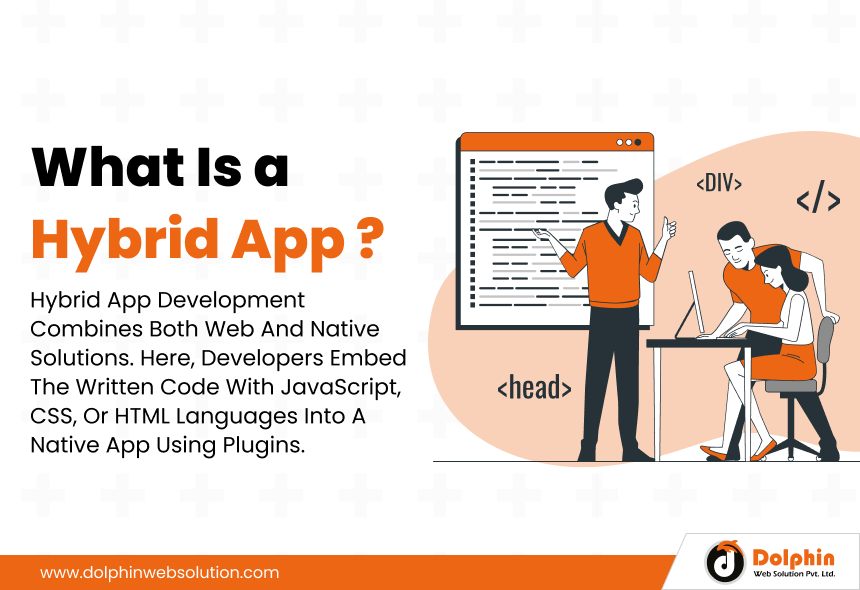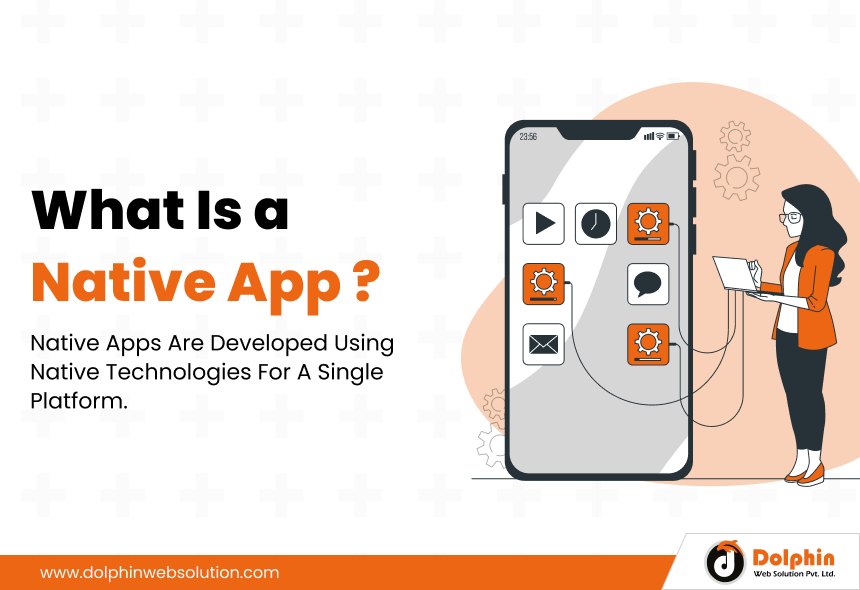Native vs Hybrid vs Cross Platform: A Comparison

Table of Contents
Summary :
Regardless of your business's industry vertical, the mobile app development platform you choose will influence the success and performance of the app. The right platform will make your app stand out, while the wrong one will vanish into oblivion. Regarding app development platforms, usually, it's a tie between native, hybrid, and cross-platform. So which one should you choose?
With continuous technological improvement, our lives are highly dependent on digital assets. We are continuously on the Internet or surfing through mobile apps. It has become a challenge to rise above the countless App Store and Play Store apps to make your target audience notice you.
In 2023, the number of app downloads worldwide is estimated to be 299 billion compared to 47 billion in 2020. In 2024, it is estimated that mobile apps will generate over $935 billion in revenues via in-app advertising and downloads. You need to prioritize functionalities, quality, and other parameters to enable your app to rule the app store market.
In this blog, we help you decide the best platform for your app — Hybrid, Native, or Cross-platform.
What is a Native App?
Native apps are developed using native technologies for a single platform. If a native app is designed for the Android system, it won’t work on iOS. This is because native apps are developed using platform-specific languages and tools.
When developing Android native apps, Kotlin or Java is used, and in the case of iOS native apps, Swift or Objective-C is used. Native mobile app development will allow you to deliver unparalleled user experience. If you want your app to have the best feel and appearance, you can opt for native mobile app development. It allows you to add more features and capabilities to the app using primary smartphone hardware elements such as camera, GPS, microphone, proximity sensors, etc.
Pros:
- Native app development uses next-gen features that are platform-specific. This engages users by providing them with a user-friendly and interactive app.
- It allows you to develop a complex app with multiple native features. You can personalize and customize the features as per your needs.
- Native app developers utilize multiple APIs, native app development tools, and kits to provide an intuitive, high-performance app.
- Native apps are less likely to develop bugs by running only one codebase.
Cons:
- The code cannot be used on multiple platforms.
- More effort and time are needed to develop and maintain a native app.
- It requires a more talented and skilled development team.
What is a Hybrid App?

Hybrid app development combines both web and native solutions. Here, developers embed the written code with JavaScript, CSS, or HTML languages into a native app using plugins. It comprises a native viewer and a backend code to display the backend and the functions.
A single code can be run on multiple platforms when you opt for hybrid app development. Even though it comes close to native app development when discussing user experience and performance, action is required for navigation patterns and UX.
Pros:
- It ensures rapid development and the launch of your app in the app market.
- It is easier to maintain hybrid apps as they are purely based on web technology.
- Developers can use a single code for multiple platforms, which minimizes cost and ensures ease of development.
- Hybrid apps offer enhanced user experience on both iOS and Android platforms. It enables fast loading of content and graphics.
- You can combine the features of two types of apps in one by hybrid app development at an affordable price.
Cons:
- Hybrid apps won’t come with offline support, and users need an internet connection to access the app.
- It may have operating system inconsistencies as a single code is deployed for multiple platforms.
What is a cross-platform App?

Cross-platform apps can run on multiple platforms as they are built using reusable code. They use shareable codes to develop apps for various OS. This helps to reduce development efforts and costs.
Cross-platform apps deliver hassle-free implementation, affordable production, and robust functionality. However, you will get little customization and high performance when you opt for a cross-platform app development framework.
Pros:
- Cross-platform app development uses reusable code backed by efficiency and productivity. This framework enjoys a competitive edge over other types of alternatives.
- Cross-platform app development utilizes only a single codebase, providing flawless business outputs. Developers can quickly test, perform upgrades, and deploy fixes. It will deliver you an app with superior quality and higher accuracy.
- Cross-platform app development framework supports all types of platforms. It allows your app to have a wider market reach and reach global customers. Cross-platform app development will be a great choice if you want your app to penetrate the market quickly. Also, this framework has reduced upfront expenses.
- Cross-platform app developers are not required to write unique code for running your app on multiple operating systems. You can use a single codebase to transfer the code to other platforms.
Cons:
- You will need a team of experienced and skilful developers to opt for cross-platform app development.
- Cross-platform app developers need help to integrate these apps into local settings. Also, the callback-style programming of cross-platform apps makes their code complex.
Native vs Hybrid vs Cross Platform: A Comparison
Now that we know the three types of mobile app development frameworks, you may think about which one will be the best approach for your business. It would help if you considered various parameters such as project requirements, target audience, demographics, budget, business model, etc.
It is challenging to choose when it comes to hybrid vs native vs cross-platform apps, but we have selected a few parameters to help you make an informed decision.
Considering these factors will allow you to explore which development framework will work best for your business and benefit your app in the long run.
1. Native vs Hybrid vs Cross Platform: Development Time
Native Development Time:
Slightly longer development time compared to hybrid and cross-platform solutions.
Cross-platform Development Time:
Cross-platform apps are ideal if you want a faster development time and quickly launch your app on the app store. Single codebase reduces development time. Faster than native apps.
Hybrid Development Time:
As code can be reused and development is done for both platforms simultaneously so development time is faster. It is faster than native apps.
Also Read:
Top 10 Food Delivery Apps in the USA2. Native vs Hybrid vs Cross Platform: Performance
Native App Performance:
If you want to deliver unparalleled user performance, then the native app development framework is a winner. It allows you to explore next-gen features on smartphones, like wireless access points, networks, etc., hassle-free. It optimizes the app’s service delivery and improves the overall app performance.
Hybrid App Performance:
Hybrid apps come next in line when it comes to performance. They achieve a performance level that is close to native apps in a cost-efficient way.
Cross-platform App Performance:
In cross-platform apps, you won’t get high-performance features. This is because they depend on an abstraction layer to interact with any underlying platform effectively.
3. Native vs Hybrid vs Cross Platform: Cost
Native App Cost:
Every business, especially start-ups, has a fixed budget when considering app development. Most companies expect a functional and modern mobile app within their planned budget. Native apps are more costly than hybrid and cross-platform apps.
Hybrid App Cost;
If you have a limited budget, native apps may not be ideal. Hybrid apps are less costlier than native apps and more costlier than cross-platform apps.
Cross-platform App Cost:
Cross-platform apps will be a great choice as your app developers will use a single course code to run the app on multiple OS. Also, it requires less resources and effort.
4. Native vs Hybrid vs Cross Platform: Functionality
Native App Functionality:
- The Native apps allow the iOS or Android platforms they are meant for to fully utilise the hardware and software capabilities of the device enhancing their performance to a great extent.
- They enable direct access to device features, APIs, and hardware, aiding developers to create highly functional and feature-rich applications.
- They extend platform-specific user experience, adhering to the design guidelines.
Hybrid App Functionality:
- Allow developers to write code once and deploy it on multiple platforms. Thus development time and costs are reduced.
- Web technologies like HTML, CSS, and JavaScript are used in making hybrid apps and so can be utilised by more developers.
- Single codebase leads to faster development.
- They are most cost-effective as the code for web development can be reused in the future.
Cross-platform App Functionality:
- Similar to hybrid apps, these also use a single codebase leading to faster development.
- They give access to native APIs and features, thus balancing between code reusability and native capabilities.
5. Native vs Hybrid vs Cross Platform: UI/UX Evaluation
Native Platform UI/UX Evaluation:
70% of users are reported to have abandoned their shopping cart after facing a bad user experience. 90% of smartphone customers are likely to shop from a particular app if they offer a great user experience. If you want to integrate personalization and customization in your app and promote improved usability, native apps are the best choice.
Hybrid UI/UX Evaluation:
You can opt for hybrid apps if you want a basic UI/UX app without much customization.
Cross-platform UI/UX Evaluation:
Cross-platform development strives to work seamlessly on multiple operating systems and devices, each with hardware capabilities, screen sizes, and resolutions. This fragmentation can make developing an optimized and consistent UI/UX difficult.
Native vs Hybrid vs Cross Platform: Which One to Choose?
Depending on your app requirements and budget, your ideal platform will change. For instance, if you have a limited budget, cross-platform apps will be suitable for you, while if you want a high-performing app with significant customization, a native app will be ideal. Consider the parameters you need in your app before making a choice for the mobile app development service ideal for you.



